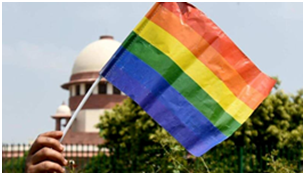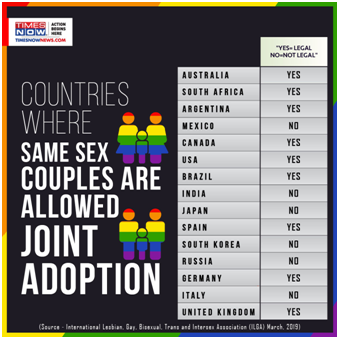LGBTQ+


LGBTQ+
Current Affairs Daily News & Issues
La Excellence IAS Academy | October 18, 2023
Why in News?
Five bench SC verdict on Same sex marriage.
Issues: SC held that only the legislature can recognise or regulate same sex marriage and courts cannot intervene; it adds there is No Fundamental Right to marry.
What are LGBTQ+ Rights?
LGBTQ+ rights refer to the legal, social, and human rights of lesbian, gay, bisexual, transgender, queer, and other gender and sexual minority (LGBTQ+) individuals.
These rights aim to create a more inclusive and just society where LGBTQ+ individuals can live openly, without fear of discrimination or persecution. These rights vary widely from country to country, with some nations being more accepting and progressive than others in their approach to LGBTQ+ rights.
Evolution of LGBTQ+ Rights in India: A Timeline of Progress
- British Colonial Era (1861): Criminalization of Homosexuality
In 1861, British colonial rulers imposed Section 377 of the Indian Penal Code, criminalizing sexual activities considered “against the order of nature,” including all homosexual activities.
- Shakuntala Devi’s Pioneering Study (1977): “The World of Homosexuals”
In 1977, Shakuntala Devi published a ground-breaking study titled “The World of Homosexuals,” marking an early exploration of homosexuality in India.
- Recognition of the Third Gender (1994): Legal Voting Rights
In 1994, transgender individuals were legally granted voting rights in India, recognizing them as a third gender.
- Naz Foundation v Government of NCT Delhi,2009 Tt is popularly known as Naz Judgement by the Delhi High Court. For the first time Section 377 was declared to be unconstitutional.
- National Legal Services Authority vs the Union of India or NALSA judgement (2014): Transgender as Third Gender
For the first time in legal history, Transgender people were recognised as citizens of this country, all the Fundamental Rights were extended to them and they were given the identity of Third Gender.
Court of India ruled that transgender people should be treated as a distinct third category of gender, acknowledging their unique identity.
- Freedom to Express Sexual Orientation (2017): LGBTQIA+ Rights
In 2017, the Supreme Court granted India’s LGBTQIA+ community the freedom to safely express their sexual orientation, marking a significant step towards inclusivity.
- Right to Privacy Protection (2017) K S Puttaswamy vs Union of India or Puttaswamy judgemen: Safeguarding Sexual Orientation
Individuals’ sexual orientation received protection under the Right to Privacy, reinforcing the importance of personal freedoms.
- Historic Repeal of Section 377 (2018): Decriminalizing Homosexuality
On September 6, 2018, the Supreme Court struck down the portion of Section 377 that criminalized consensual homosexual activities, a momentous victory for LGBTQ+ rights.
- Enactment of Transgender Rights Act (2019): Protecting Transgender Individuals
AIM: safeguarding the rights and welfare of transgender people without altering their identity.
Provisions:
i. Non-discrimination against a Transgender person in educational institutions, employment, healthcare services etc.
ii. Recognition of identity of Transgender persons and confer upon them the right to self-perceived gender identity.
iii. Provision of the Right of Residence with parents and immediate family members.
iv. Provision for the formulation of welfare schemes and programmes for education, social security, and health of Transgender persons.
v. Provision for National Council for Transgender Persons to advise, monitor, and evaluate measures for the protection of their rights.
The Bill is designed to make all the stakeholders responsive and accountable for upholding the principles underlying the Bill.
It also brings greater accountability on the part of the Central Government and State Governments/Union Territories Administrations for issues concerning Transgender persons.
What are punishable offences under this Act?
Punishable offences under the act are: if anyone compels or entices a transgender person to take part in forced or bonded labour, other than any compulsory service imposed by the government; denies a transgender person the right of passage to a public place, or obstructs such access; forces or causes a transgender person to leave a household, village or other place of residence; or harms or endangers the life, safety, health or well-being – whether mental or physical – of a transgender person, or engages in physical, sexual, verbal, emotional or economic abuse against them.
In all such instances, the person or persons shall be punishable with a fine, and imprisonment of at least six months and up to two years.
The Central government has enacted and issued several welfare acts.
which are mentioned below:
- National Council for Transgender Persons: advises the Central Government on the formulation of policies, programmes, legislation
and projects with respect to transgender persons.
- SMILE (Support for Marginalised Individuals for Livelihood and Enterprise): The Ministry of Social Justice and Empowerment launched
this scheme which includes various welfare measures for transgender persons such as financial assistance in the form of scholarships to transgender students studying in classes Ninth till
post-graduation, skill development training & livelihood, composite medical health.
- Setting up of Garima Grehs in each state for providing shelter facility for abandoned and orphaned transgender persons, setting up of transgender protection cells in the entire country for providing quick redressal of offences & crimes against transgender persons etc.
- National Portal for Transgender Persons: Any Transgender applicant can
obtain a certificate of identity and identity card without any physical interface with the office of issue.
Five bench Judge arguments (2:3)

- Supreme Court held that “the court can’t make law but only interpret it and it is for Parliament to change the Special Marriage Act.
- Queer is a natural phenomenon known for ages and is neither urban nor elitist.
- “Non-heterosexual and heterosexual unions must be seen as both sides of same coin,” adding that legal recognition of non-heterosexual unions is step towards marriage equality.
- Government stated that the Centre will form a committee to decide the rights and entitlements of persons in queer unions.
- It directed the Centre, states and UTs to take steps to sensitise public about queer rights and ensure that inter-sex children are not allowed sex-change operations at an age .
Should LGBTQ+ marriages be legalized?
1. Human Rights: All individuals, regardless of their sexual orientation, gender identity, or gender expression, deserve to be treated with dignity and respect.
Article 21: Guarantees Right to Life and Right to Privacy.
2. Equality: No discrimination a based on race, religion, or gender, sexual orientation or gender identity.
Article 14: Guarantees Right to Equality.
3. Mental and Physical Health: Embracing LGBTQ+ rights can reduce the rates of depression, anxiety, and suicide, and improve overall well-being.
4. Economic Benefits: Inclusive policies can attract a diverse and talented workforce, which can positively impact businesses and economies.
Article 19(1)(g) Right to work
5. Family Rights: Right to marry and raise children. Allowing same-sex couples to marry and adopt can create stable, loving families. Property rights can be transferred
6. Mental Health of Youth: Embracing LGBTQ+ rights in schools and communities can create safer environments for these youth.
7. HIV/AIDS Prevention: Policies that promote LGBTQ+ rights can also improve access to healthcare and HIV prevention services.
8. No Exploitation : exploitation of the community can be stopped
Arguments against same-sex marriage:
- Religious Definitions: Many religions traditionally define marriage as between a man and a woman.
- State’s Interest: The state has a legitimate interest in regulating marriage and personal relationships, as it does with age of consent, prohibited degrees of marriage, and divorce.
- Right to Privacy: While the right to privacy is recognized, marriage has a public aspect that can’t be entirely private.
- Legislation by Parliament: Only Parliament should decide on same-sex marriage, not the courts, due to potential unintended consequences and complexity.
- Interpretation of Law: The Special Marriage Act may not be easily interpreted to include same-sex marriage without revaluating its entire framework.
- Issues with Adoption: Same-sex couples adopting children can face societal stigma and discrimination in some societies.
- Gendered Terms: Gendered terms like ‘mother’ and ‘father,’ ‘husband’ and ‘wife’ may be problematic in same-sex marriages.


Challenges:
- At present Indian law does not explicitly allow same-sex marriage. However, there have been discussions and legal challenges urging the recognition of marriage equality.
- Additionally, adoption rights for LGBTQ+ couples remain a topic of debate and contention, with limited clarity on whether same-sex couples can legally adopt children.
Yet, The queer people have a fundamental right to form a relationship, and the state should not fail to give such unions a legal status so that same-sex couples could avail the material benefits provided under the law.
Leave a Reply
You must be logged in to post a comment.
